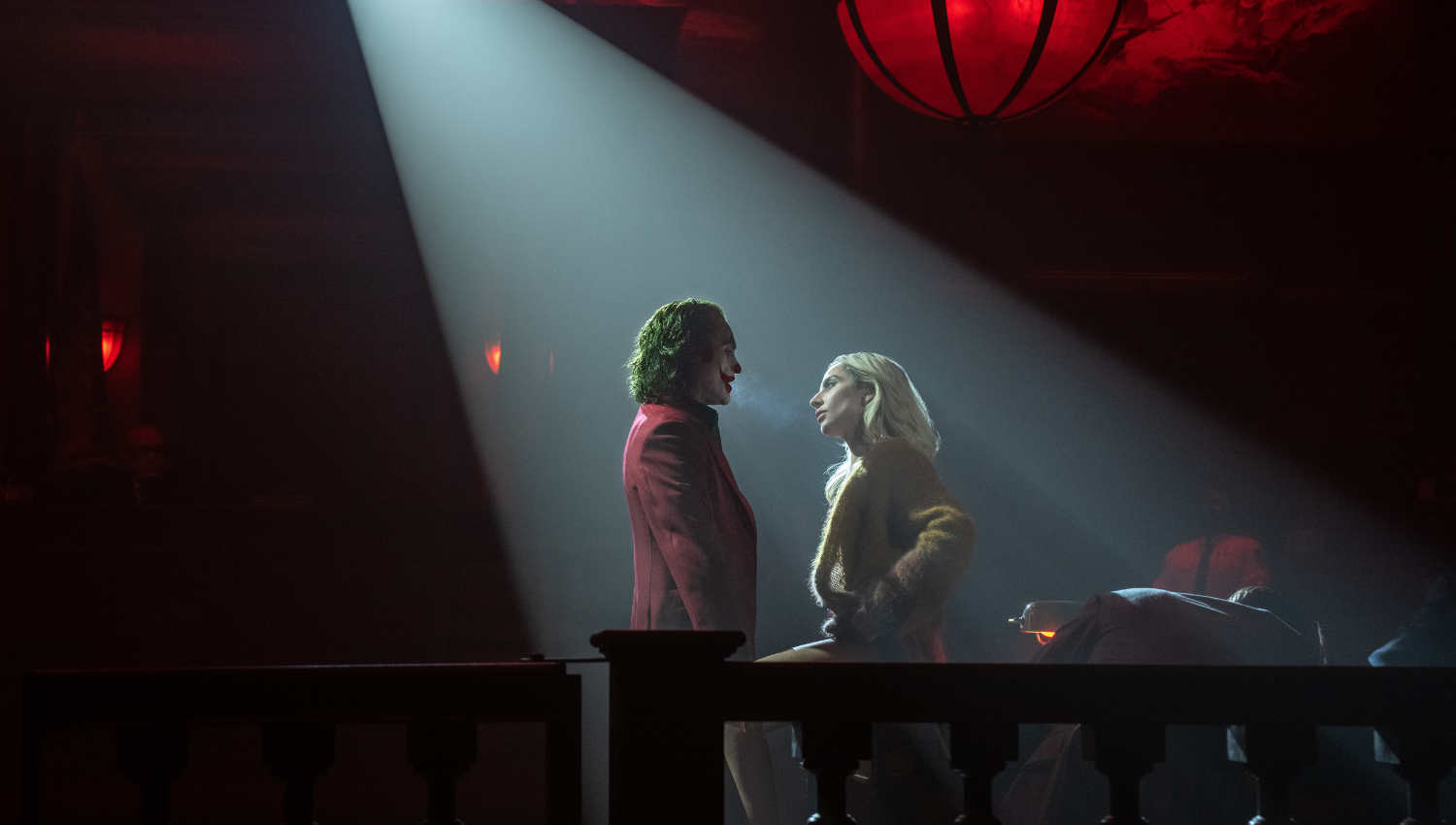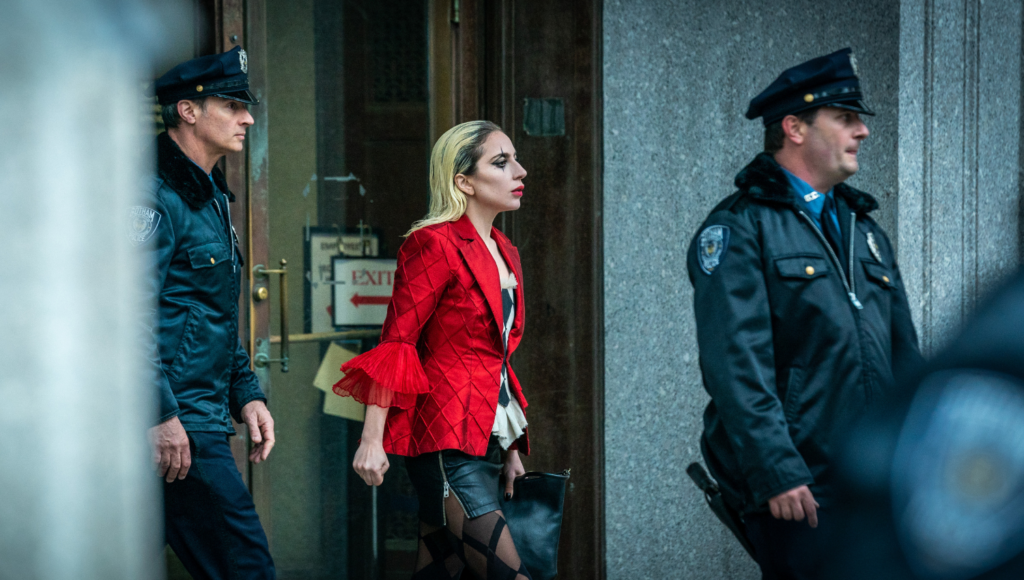
Joker: Folie Á Deux
Mark White
Sometimes, an idea for a movie – even with the best of artistic design and intentions – just should not be made. A case in point is Todd Phillip’s Joker: Folie Á Deux.
2019’s Joker was an origin story set in a dark, grimy Gotham City before Bruce Wayne ever dons the cowl and cape, introducing audiences to Arthur Fleck – a failed street clown and wannabe comic with mental health issues and neurological defects – who has a series of really bad days that take him down a road of murderous outbursts, face paint, and a compulsive cackle. Joker divided audiences right down the middle. Some were mesmerized by the Scorsese-like grit and violence on display as Joaquin Phoenix, emaciated and fragile, dealt with abuse and neglect that compelled him to lash out to survive; others were repulsed by an apparent glorification of and heavy-handed sympathy to ‘incel’ culture, extreme violence, and a bleak outlook on society’s ability to care for the mentally ill. Over a billion box office dollars, two Academy Award wins, and becoming the record holder for the highest-grossing R-rated film of all time (until Deadpool & Wolverine) all seemed to vindicate Phillips’ violent and extreme vision. Joker played like an ace in the hole, and somehow—perhaps inevitably—with studio support and a game lead star, Phillips claims he has reason to return to that version of Gotham—to this version of the Clown Prince of Crime. Sadly, this time, the jokes and punches struggle to land.

Folie Á Deux picks up with Arthur Fleck (Phoenix) two years after the violent on-air murder of talk show host Murray Franklin (Robert De Niro). Arthur resides in the maximum security wing at Arkham Asylum, barely speaking to anyone. He seemingly has his laughing ‘tick’ in check, and is attempting to be a model inmate as he awaits the start of his long gestating trial. His good behavior keeps the volatile and quasi-abusive guards on side – playfully (sometimes menacingly) asking Arthur if he has a joke for them each day. Jackie, one of the guards (Brendan Gleeson), takes it upon himself to try and reward Arthur for his good behavior by getting Arthur signed up for a music class in the lower security wing; ‘we use music to make us whole’, says the Arkham music teacher, with the hope that Arthur will take to a healthy form of self expression as he contemplates punishment in prison for decades to come…or worse. It is in this music class that Arthur meets Harleen Quinzel (Lady Gaga) – Lee for short – a young woman with wild eyes and a deep appreciation for Arthur’s crimes as ‘Joker’. Lee and Arthur trade their criminal past stories while Lee fawns over the liberated joy and rapture she felt when she saw the TV movie made about Arthur’s crimes, telling him that after seeing what Joker can do, she did not feel alone anymore. Time passes, and Arthur begins to feel a kindred spirit with Lee, and Lee is clearly besotted with Arthur, looking to spend as much time with him as she can. As Arthur’s trial looms, everyone from Arthur’s legal team to the newly appointed assistant district attorney Harvey Dent (Harry Lawtey) is looking to determine whether ‘Joker’ is a part of Arthur’s mental illness, or simply a performative act. But to Lee, guilty or not, it does not matter, as she does not seem to want anything but to be close to her Joker. Are they star-crossed lovers – can Arthur and Lee ever really be together? Should they be? Or is what they share simply a shared delusion?
It is really quite difficult to pin down the one specific element of this film that accurately defines its failure. Contrary to the insistence of everyone involved in the press tour, Folie Á Deux is indeed a musical, and no amount of twisting the definition will change that; without any chorus lines or fourth wall-breaking, Folie Á Deux still has sections of dialogue sung from one character to another as well as ‘dream sequences’ or daydreams done in fantastical song, only to reveal these moments as thoughts or delusions in Arthur’s mind – as so many musicals have done in the past. But some numbers are oddly truncated, a few are barely staged or performed while others are lavishly performed with massive sets and extended interludes, resulting in a sneaking feeling that the team behind the scenes feared the music as much as they loved the idea of it being an extension of Arthur – and Lee’s – madness, so the film as a result seems to wade into the deep waters of musical film, only to come screaming and running away from it for fear of the melodic rip tide. All of this means that the songs feel rushed, and that musical talents of Phoenix and Gaga – especially Gaga – are never properly showcased as one may hope.
Bewildered sequel fails to feel bothered despite a bewitching Lady Gaga, Joaquin Phoenix, a bigger budget, and a sensational soundtrack.
While on the subject, the film also does not know what to do with Lady Gaga’s Lee. Gaga has proven a brave and formative actress in just a few films, and her performance as Lee is beguiling. Her scenes are mostly with Phoenix in conversation or in song, and there is something in the way that Gaga directs her gaze and intent at Phoenix’s Arthur with eyes that seem to almost spontaneously combust, her mouth and cheeks itching for something. Gaga’s Lee always feel dangerous – possessed of a need, of a twisted energy – before showcasing any form of affection or adoration for Arthur, so much that very early on a sense of unease and tension hangs over scenes where Arthur and Lee are together. We are fascinated with this ‘Harley’, but apprehensive of her as well. Sadly, and perhaps because she is a famous singer and because Arthur is still the lead, Gaga is largely relegated to singing classic jazz and swing standards to technical perfection, giving dangerous glances with potent subtext… and not much else. Lee is neither a distinct reinterpretation of the famous Harley Quinn, nor a terrible imitation of Arleen Sorkin’s animated version – or Margot Robbie’s take. Phillips and Gaga steer clear of the comics and of Robbie altogether and make Lee…an adulterated distillation of what Harley is meant to be. Again, half in and half out, Gaga’s Lee is never explored outside of rote song lyrics and some exposition that crosses off her comic book origins to affirm that this is Harleen, just not like we know her to be. As for Phoenix, whose singing talents were on display in Walk the Line several years ago, his croaking and uneven vocals match the faltering and fragile state of mind that he brought to Arthur the first time around; even after an Oscar win for the same role, Phoenix is just as committed and specific with his Arthur as ever. Same as the last time, only with songs thrown in for good measure. Phoenix’s Arthur remains complex, broken, and longing for compassion.
And perhaps that is where the specific failure can be underscored: nothing new is said or discovered here about Arthur that makes this film worthwhile. Joker, solemn and grim as could be, was a character study that forcibly examined societal acceptance of the relegation and misery of the mentally ill while terrifying us with the discovery of an empathy for people who may have been pushed too far. Phillips’ film aimed between the eyes of every audience member as it worked over the heartstrings below. Arthur was abused, maligned, taken advantage of and seriously unwell, which always drew out a collective sense of compassion for him. But because of social fear around the mentally unwell, and the very real dangers of these people – to themselves or others – when not receiving help and care, the audience is always ready to recoil when the madness gets out of hand, as it does finally on that talk show stage.
Folie Á Deux introduces Lee in Arthur’s life as a possible ‘answer’ to all of the neglect and suffering he has carried with him, but in failing to provide anything more than songs and some unique outfits for Gaga to wear, Lee remains nothing more than an alluring question mark that Arthur too eagerly clings to, making him a victim all over again as he falls prey to different kinds of torment and soul searching than he has ever felt. What is worse is that the relationship between Joker and Harley Quinn is so famous in popular culture – for its give and take, its obsessive devotion and possession, the abuse involved – that the film, perhaps unfairly, is almost required to either embrace that dynamic or reject it outright. Instead it – once again – goes half way and walks it back, rendering the entire set up and finale all rather futile as… well, let us just say that the ending leaves a lot unanswered and feeling woefully irrelevant.
So… the music gets away from the intention. The newest central character takes center stage but lacks genuine purpose, while the main character remains static. What is the point to Folie Á Deux? Phillips has talked about loving the Arthur Fleck character and wanting to continue his story. But perhaps Phillips’ biggest mistake is that he forgot that Joker never needed a sequel. What Phillips did with Joker was take advantage of the nebulous origins of arguably the most famous villain ever written and redefine him within a singular purpose; he showed us how a villain can be made by the world it lives in, and force us to reckon with the humanity of that villain in that ugly space. By returning with Folie Á Deux, Phillips has attempted to extend that analysis, but has only served to repeat himself, and much with less control, focus, and originality on the encore. The thing that makes the sequel’s failures really standout then, is that while repeating himself and losing focus, Phillips had the power and backing of the studio to go big and take huge swings – Lady Gaga, big show pieces, musical numbers – but ends up serving them up with no other purpose than to remind us that Joker came first.
A joke is most effective the first time it is told… repeating it usually is nowhere near as effective.
Final Thought
Stop - we’ve heard this one before.
